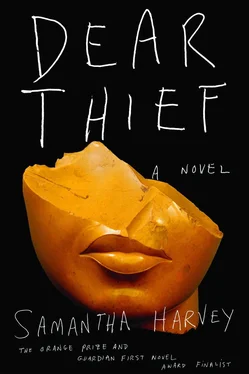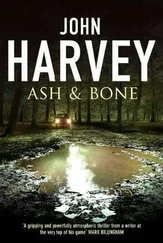Nicolas switched on a spotlight. There was just one column of white light spiralling diagonally through darkness to the left-hand side of the stage, which seemed a number of miles away. The Royalty was a big thousand-seater theatre, and the darkness took away its walls and made it a ten-thousand-seater, fifty-thousand. With torches we climbed down into the auditorium and Nicolas sat at the back of the stalls. He said, ‘Go to the stage and stand in the spotlight.’ I picked my path there slowly. I put my feet in the centre of the circle of light and laid the torch down. I asked what I should say. ‘Tell me about the men you’ve known,’ he replied.
There had been some men in passing, I told him, though I couldn’t see him in the glare. Some men — or, rather, many men. There wasn’t much else to do out on the Welsh Borders. You finish your A levels, you are so busy discovering yourself that you forget to go to college or get a vocation, you start working in a pub and, when your best and only friend leaves town, you become a loner and invest yourself in things that rely little on the company of others, like pleaching willow and learning how to slum it comfortably under the stars, and singing. You start singing in the pub on the evenings you’re not working and people come to see you because you have a good voice and an unintentionally provocative appearance — it isn’t your clothes that provoke but what is underneath them, despite your efforts to cover it. The singing is short-lived, you realise you love the company of others, but only when they are indifferent to you. You like trees and fungus and the challenge of making water boil in a tin pot, and rinsing the coffee cup in the river — rain even better — so that you can pour wine into it and sleep deeply and wake up thirsty and starving.
None of the men had been of much note, I told him, and to my surprise he found this sad. It was the only time he interrupted my speech, and his voice came from the dark and was thin with distance. ‘Many men and none of note? Do you not think maybe you chose the wrong men?’ But the thing is of course that choice had little to do with it. Shropshire is not London. Not that you take whatever you can get, just that you have to take some of what you can get, and what you could get then was severely restricted. Anyway, the need for meaningful solitude is sometimes best met by being in meaningless company, wasn’t that the paradox? He probably baulked at the word meaningless, maybe because he imagined the possibility of himself being just such a man who delivered nothing to a woman. But they were not nothing, I tried to explain, they were just something without meaning and without note. All sorts of perfectly good things fall into this category.
When it came to his turn, and we swapped places so that I was near-invisible in the stalls and he was the one in the spotlight, he explained that he, himself, had been more reserved and thoughtful. He had been in love, but not often, and not the love his mother had told him to hold out for, but still, nothing meaningless. Well, almost nothing. Maybe one or two. His girlfriends tended to be small and slender with one particular part of their bodies of which they were mortally ashamed, though this had never been the eyes, which in four of six cases had been brown, bright and lovely.
They tended to have fringes, he said, and birthmarks. Fringes were like well-kept gardens and denoted a homely girl with an open, tidy face. You see, you are brought up in the Kent marshes, just you and your mother in a wooden house whose land has no boundaries, you just guess at where the garden might end and where the acres of treasure-studded flatness begin. It is just a changeable guess. Then a miracle: when you are fourteen you move with your mother’s new husband — who has emitted from nowhere and married her so fast even you missed the wedding — to a wholesome suburb of New Hampshire where the sun is very often out and the large gardens demarcated and where the seasons arrive with clear intention in discreet unmistakable blocks. Glorious times of having and giving. Pumpkins as big as a full moon.
America! Where you find a home for your enormous smile, where the gap between your two front teeth is no longer a defect but an open door through which girls hurl themselves, where the dimple in your large chin turns you from an awkward kid into an all-American youth, easy and jokey, where you learn that expression of almost permanent sardonic amusement, and take to wearing aftershave and growing stubble and holding your head proud, where people call you dashing ; you take to amateur dramatics and discover that you have the kind of face that can do anything. It can suit a baseball player or an intellectual, depending on how much stubble and whether a T-shirt or a linen shirt, and whether the prescription glasses — once the bane of your life — are on or off. If off, and if bouncing a ball from knee to knee, you are the high-school heartthrob. And if on, suddenly you can be a New York Jew, clever and sharp and easy, playing life and winning; playing life and always winning.
Three years on, when the marriage collapses, you and your mother move to Deptford and live in a house next to a piece of derelict and apocalyptic ground bafflingly named Twinkle Park, and you seek girls with fringes to allay your homesickness. How do you really feel about fringes? How do you really feel about the scraps of New England accent that still hang around your speech when you are losing confidence and feel threatened? If America is what protects you, and if America is thousands of miles away in a life you barely even had, what protects you?
So now you are thinking about your future and your career, about lights, how to get a paid job doing lighting for stage or screen, and though you are twenty-five you haven’t slept with anyone, fringe or no, for eighteen months — or hadn’t, that is, until a month before and what could now be called the Night of the Bones, though you are not sure about the momentousness of this title. The affair might come to nothing and then it will be lumbered with a label that portends something big. Better just to say, since that night on the filthy Thames beach. Or more rightly, since the morning after that night on the filthy Thames beach.
Later on Nicolas turned off the spotlight and we found our way backstage with torches. In the wings we made a nest of blankets and drapes that we found in the dressing rooms, and an Oh! Calcutta! banner, which we used as a sheet. We stripped off without any mention of each other’s spotlit sexual summaries, because he knew enough of my bored promiscuity to be determined to make it a thing of the past, and I knew enough of his outgrown fetish for the neat and the safe to be determined to make him kiss my fringeless forehead and wish himself well clear of his boyhood and his New England pumpkins. ‘I will marry you if you like,’ Nicolas said—‘but I have no money.’ I asked him what it cost to get married but he had no idea. I said, ‘I could sell some things, I have a bracelet, a bike I’ve never ridden, I have a piano.’
‘ Oh! Calcutta! ’ he grinned, and eased himself on top of me. We lay still. He asked me which particular part of my body I was ashamed of and I told him the part between the crown of my head and the soles of my feet. Maybe because he felt I meant it, he seemed pleased. Whole-body shame is part of a bleak and complex way of being that has nothing to do with gardens laid neatly to lawn. ‘You’re a baroque,’ he said, ‘an irregular pearl, one that isn’t spherical or symmetrical.’ ‘The cheapest, then,’ I answered. ‘Unique, though, and beautiful.’ I sighed: ‘How embarrassing — in this torchlight you’ve mistaken me for somebody else. In the morning light you’ll look at me and quickly dress and scurry away.’
Читать дальше












